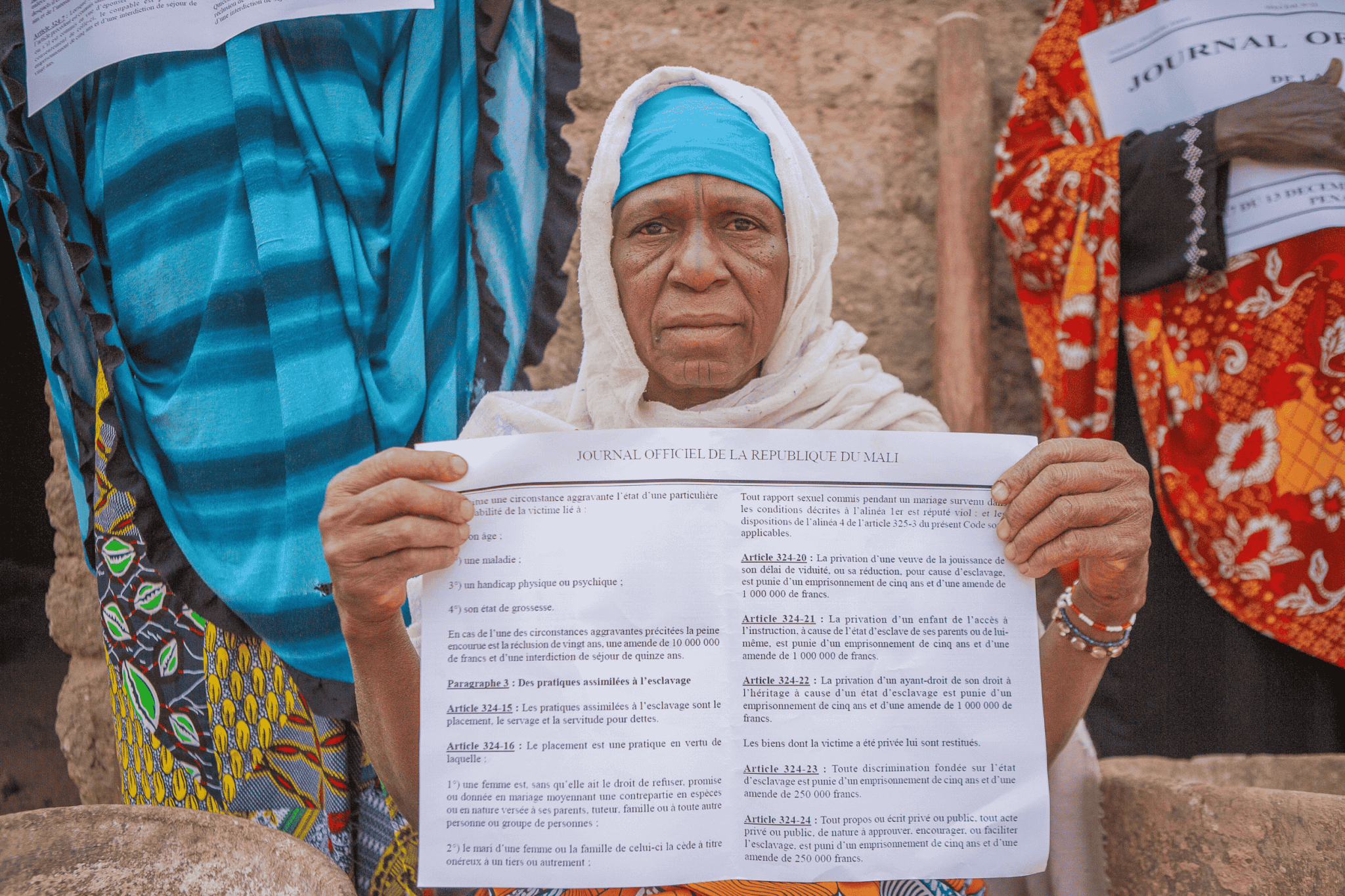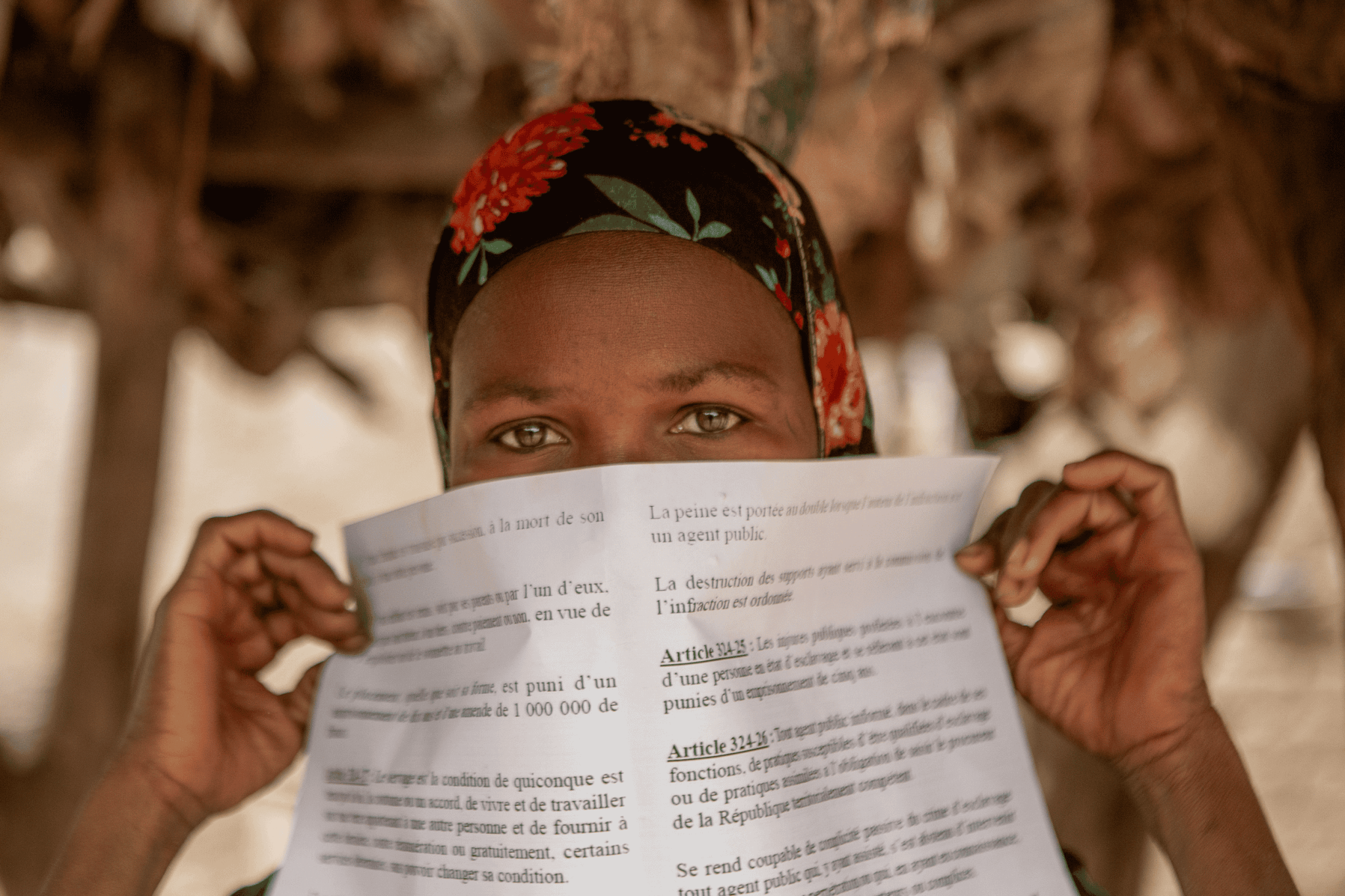
Victims of slavery by descent from the Kita region of Mali have received a copy of the 17 new articles introduced into the Malian Penal Code that criminalize slavery © King Massassy
Lawyers Without Borders Canada (LWB Canada) has been supporting the Malian association TEMEDT in its advocacy against descent-based slavery in Mali for eight years, with financial support from Global Affairs Canada. On December 14, 2024, the National Transition Council approved a new version of the Penal Code that explicitly criminalizes slavery and related practices, including slavery by descent. This is an unprecedented step forward that could give hope to the 800,000 victims of this harmful traditional practice.
Descent-based slavery assigns slave status at birth to individuals born to parents who are themselves slaves. It is based on customs and traditions within certain hierarchical communities, where the person considered as slaves cannot claim or fully exercise their rights.
Previously, Malian Penal Code only recognized slavery in its strict sense, omitting societal or economic situations that give rise to other forms of slavery, such as descent-based slavery. Article 324-15 now broadens this definition by including practices similar to slavery, such as serfdom, where individuals are bound to land they do not own and are forced to maintain it without any possibility of changing their condition.
The introduction of this new legal provision echoes the demands made even in international forums by TEMEDT and LWB Canada as part of the “Support for Justice and Peace in Mali” (JUPAX) project to end descent-based slavery in Mali. It follows several victories for victims of this harmful practice, including the confirmation by the Supreme Court of their right to land ownership.
Better protection for women victims of descent-based slavery

The new Malian Penal Code provides additional protections for women victims of slavery and trafficking, who are disproportionately exposed to related violence © King Massassy
Women victims of descent-based slavery in Mali suffer from double vulnerability, linked both to their inherited slave status and to their gender. In addition to being considered “born to serve” because of their ancestry, they are subjected to sexual violence, forced and early marriage, as well as domestic or economic exploitation.
The new Penal Code does not recognize the specific nature of the violence experienced by women in slavery. However, it explicitly criminalizes sexual slavery (Article 324-14) and outlaws the forced marriage of an enslaved woman (Article 324-19). From now on, anyone forced into sexual acts through abuse of power, whether resulting from the purchase, loan or exchange of a person, is protected by this legislation. Article 324-19 also represents significant progress by systematically defining any sexual act within a forced mariage imposed under slavery as rape. These provisions are major legislative advances.
However, the impact of these protections are limited by a social context where the weight of social norms and the silence imposed by disapproval make it difficult to identify, to provide holistic support, and empower women who are victims of slavery by descent.
The authorities must take all measures to enforce these new laws.
The new Malian Penal Code introduces 17 new articles (324-12 to 324-28) addressing different forms of slavery, thereby strengthening the legislative framework to combat slavery and related practices. The full text is available at the Malian human rights library Sariya Ko Mun? Que dit la loi?.
The provisions added to the Malian Penal Code represent an undeniable progress for human rights in Mali. However, to truly benefit those most in need, these laws must be fully disseminated and effectively enforced. Notably, public officials must report all known cases of slavery to the competent Public Prosecutor, as required by Article 324-26 of the Criminal Code. This mandatory reporting obligation, coupled with sanctions for complicity or inaction, makes public officials key actor in the prevention and suppression of slavery in Mali
Malian authorities must work in collaboration with human rights organizations, such as TEMEDT, to ensure genuine protection for victims and to prevent the perpetuation of slavery in all its forms.
About the “Support for Justice and Peace in Mali” (JUPAX) project
The JUPAX project, implemented from 2021 to 2025, fostered the legal empowerment of women, girls, and other people in vulnerable situations, enabling them to realize their human rights within a framework of gender equality, transformation of power relations, reconciliation, and peace in Mali.
Since its launch, the project has contributed to strengthening the next generation of human rights defenders in Mali, combating impunity, and amplifying the voices of victims.
Other content that may interest you